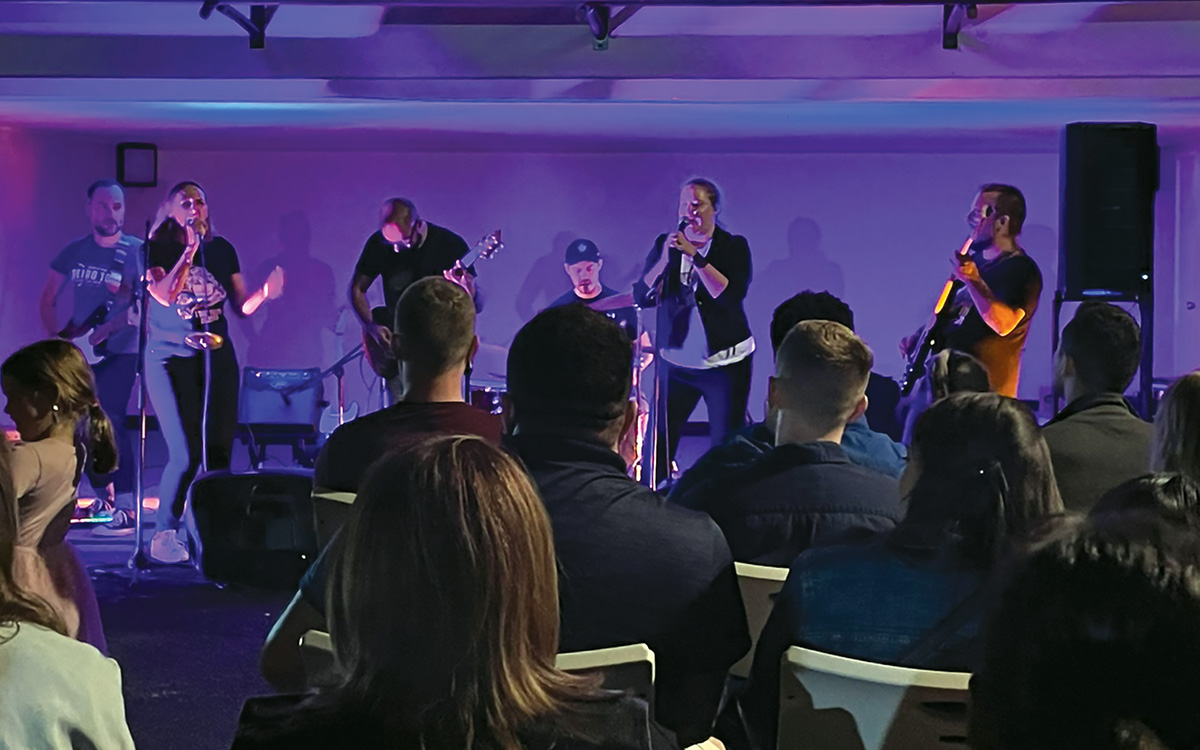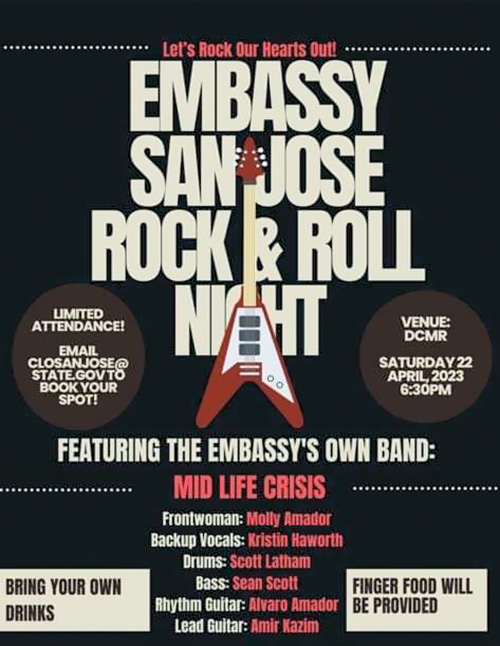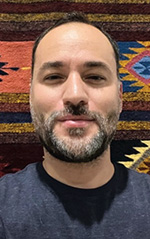Rock Your Heart Out
If being a diplomat becomes your only identity, it’s time to revive those things that brought you joy in the past.
BY ALVARO AMADOR MUNIZ

istockphoto / Cesare Ferrari
On a late April afternoon, the dark clouds dissipated after an unseasonal thunderstorm showered the banana trees and the tropical gardens of the deputy chief of mission’s (DCM) residence in San José, Costa Rica. The residence was ready to receive the embassy community and local friends for the long-awaited debut of U.S. Embassy San José’s own rock band, Mid-Life Crisis.
As the sun set behind the mountains, intrigued guests were lining up at the security checkpoint. Foreign Service members, local staff, contractors, and even the ambassador were ready to enjoy the show. Guitars were tuned, drums were set up, sound equipment was equalized, and the band was hyped and ready to rock and roll.
The crowd burst with excitement when the sound of the first strident notes of the bass floated across San José’s serene night sky. They screamed and clapped when the lights dimmed, and the band began to play their opener, “Enter Sandman” by Metallica. The band continued with a set list that took the crowd through rock classics of the 1990s and 2000s, with songs from the Black Keys, the White Stripes, Weezer, and the Strokes. The DCM, boosted by the crowd, joined the group and delivered an electrifying performance of “Song 2” by Blur, bringing everyone to their feet.
Music allowed us to forget for a moment about our next assignments, employee evaluation review (EER) deadlines, visa wait times, public affairs crises.
After almost two hours of show, the lead singer wrapped up the performance by reminding the crowd that the show was the result of a group of colleagues and friends coming together to decompress and have fun, and at the end of the day we should all take the time to “pursue your passions, don’t ever forget who you really are.” Though the band played their closer, “Gigantic” by the Pixies, the euphoric fans were not ready to go home and demanded an encore. With one more surprise for the crowd, Mid-Life Crisis returned to the stage and told the audience: “Tengo una buena canción para ustedes [I have a great song for you].” As the guitar player hit the first power chords, the crowd went wild for the song, “De Música Ligera,” one of the all-time rock classics in Spanish by an Argentinian band called Soda Stereo. Everyone was dancing and singing at the top of their lungs in the crisp night air.
Putting Professional Identities Aside
Mid-Life Crisis had formed just a few months prior to the show as a jam session between two friends, a consular officer with vast musical experience and me, the ESO logistician who had just bought an electric guitar as an attempt to revive my high school years of rock ’n’ roll glory. As we talked about how much fun it was to play together, the word spread rapidly in the embassy; more colleagues came out of the woodwork, dusted off their musical instruments, and joined us. Soon we had a full rock band: the two original amigos; (my wife) the visa chief as our lead singer; the office management specialist as our lead guitarist; the public affairs officer on backup vocals; and a Canadian neighbor on drums. Even the DCM jammed with us occasionally.
We practiced once a week, during the weekends, or whenever our parenting and professional responsibilities allowed. Sometimes we even had to bring our kids to practice with their noise-canceling headphones. That’s also why our 8-year-old daughter ended up singing backup vocals in the concert too. We were probably not Rolling Stone magazine material, but we sure had a blast every time we practiced. When we played together, we put our professional identities aside; we reconnected with our true selves and left the practice feeling like we had been to the spa.
Happy individuals make successful professionals.
Music allowed us to forget for a moment about our next assignments, employee evaluation review (EER) deadlines, visa wait times, public affairs crises. During practice, we were only concerned about hitting the right note, about not messing up lyrics, and about pressing that foot pedal on time for the solo. We were just some friends from very different backgrounds rocking our hearts out. (We did bring the duty phone with us to practice though.) When the song sounded right, it was all worth it.
When I joined Foreign Service life as a spouse (technically, an “eligible family member,” or EFM) back in 2011, I quickly learned that this exciting career could also be absorbing and overwhelming. This reality hit me hard when I moved to our first post and suddenly all aspects of my new life were associated with work. My housing assignment, the transportation of my belongings, my job opportunities, the part of the world where I lived, and even the furniture of my apartment were constant reminders of the job. On the weekends when we gathered with friends for cookouts or parties, the conversation was almost always … about work. Our neighbors were also our colleagues, and our friends were 90 percent people from work. I realized then that more than a career, the Foreign Service was a lifestyle, a thrilling but challenging one.
Within a matter of months I was not only fluent in a foreign language but was also capable of understanding Foreign Service lingo. Suddenly, I was an expert on acronyms, I knew the meaning of HHE, UAB, GSO, RSO, TSP, and a long list of terms needed for basic Foreign Service survival. Soon, and without realizing it, I had difficulty defining myself outside the Department of State world. My EFM life had sneaked into my personal life and taken over. Who was I, if not an EFM serving overseas?

Embassy San José’s own rock band, Mid-Life Crisis, performing at the deputy chief of mission’s residence in April 2023. From left: Alvaro Amador, Molly Amador, Amir Kazim, Scott Latham, Kristin Haworth, and Sean Scott.
Courtesy of Alvaro Amador Muniz
The Struggle for Work-Life Balance
The more I talked with my friends and colleagues about my struggle, the more I realized I was not alone, that many of them were experiencing similar feelings. Some of them had been professional basketball players, teachers, dancers, cartoonists, sommeliers, and worked in other exciting professions in their life before the Foreign Service. At some point, the Foreign Service took over their whole identity, and just like me, they struggled to define themselves. This type of problem is not exclusive to the Foreign Service; I know many people who define themselves by their job title, especially in the Washington, D.C., area. It is an issue that we need to confront in American life, to balance our work with our outside lives.

Courtesy of Alvaro Amador Muniz
The constant self-questioning threw me into a deep existential crisis, and it inevitably landed me on the chaise lounge where I spent long hours talking with my psychologist trying to get some clarity about what I was going through and how I could change it. I could not help feeling silly whining to my therapist about how difficult my life was in Milan, Mexico City, and San José; I was complaining about what others might consider a dream life. But my psychologist understood very well: the daughter of a diplomatic family, herself, she knew exactly what I was talking about.
She explained to me that what I was going through was a condition called “professional enmeshment,” a situation where the boundaries between people and their professions become imperceptible, and individual identities start losing relevance. She hit the nail on the head with this diagnosis. At some point, I had become a professional EFM, expert on learning a new job every three years, always flexible, ready for new challenges, an authority on shipping rules and international pet relocation protocols. I forgot about my passion for music. I had also abandoned my enjoyable if fruitless attempts to dunk the basketball and my desire to become a published writer. I had forgotten about myself.
I identified my problem, and that was great progress; but now I had more questions. “How do I get out of this?” My psychologist warned me up front: there were no shortcuts—reconnecting to myself was going to be a long and uncomfortable process. She asked me to look deep inside and to revive those things that brought me joy in the past, that used to define me as a person. I had to start doing something that did not require work-related skills, and I had to start exercising those other parts of my brain that I had not used in years.
The Way Back to Myself
The therapist also insisted on the importance of rebuilding my neglected network. I had to somehow look beyond my title (professional EFM) and understand that a career is just one component of our overall life. It was then that I had a eureka moment, and a voice inside whispered, “an electric guitar,” and then grumbled a little: “I used to love making noise with that thing.” My old friends teased me for wanting to rekindle those rock dreams, but I felt it was time. So I did it! I bought that Stratocaster guitar, an amp, and some pedals. I started jamming with a friend, then another, then started the band—and that showed me the way back to myself.
Now, let me clarify something. Being proud of your title and going the extra mile is not a bad thing. Becoming a U.S. diplomat is as hard as making it to the NBA; it is an accomplishment and an honor you should be proud of. We sometimes work in exceptionally stressful environments, and we want to give it our all, but we need to be mindful, aware of our mental health. You don’t need to stop being yourself to be a good diplomat or EFM; happy individuals make successful professionals. Go out there and join a soccer team, run that marathon, learn painting, write that book, or form an awesome rock band like I did.
Since our first performance at the DCM’s residence, we have added more songs to our set list and booked a gig in a local bar in downtown San José. We are not only having fun, but we are bringing our own sort of music diplomacy to town. We are “the band of the Americans (and one Canadian),” fully integrated and enjoying being part of the Costa Rican community.
When sharing or linking to FSJ articles online, which we welcome and encourage, please be sure to cite the magazine (The Foreign Service Journal) and the month and year of publication. Please check the permissions page for further details.
Read More...
- “HOC Rocks! (Husbands of Chennai)” by Aileen Crowe Nandi, The Foreign Service Journal, April 2012
- “A ‘Trailing’ Spouse?” by Jessie Bryson, The Foreign Service Journal, March 2014
- “Motley Crew of Musicians Conducts Public Diplomacy at a Very High Volume” by Shawn Dorman, Washington Diplomat, March 2019




